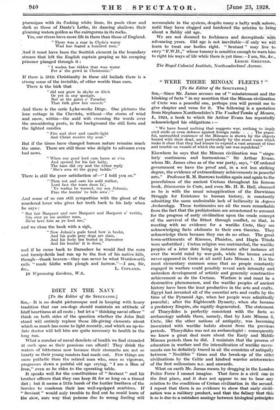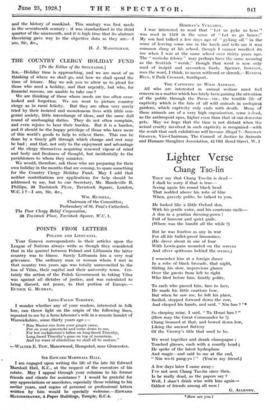" WERE THERE MINOAN FLEETS ? " [To the Editor
of the SPECTATOR.] Sra,—Since Mr. James accuses me of " misstatement and the blinking of facts " in my assertion that the Minoan civilization of Crete was a peaceful one, perhaps you will permit me to give chapter and verse for it. The following is a quotation from Stephanos Xanthoudides's The Vaulted Tombs of Mesara, L, 1924, a book to which Sir Arthur Evans has repeatedly
acknowledged his obligations :— •
" We have found nothing that 'suggests war, nothing to imply civil strife or even defence against foreign raids. . . . The peace- ful, untroubled existence of the Minoan is shown by the objects buried with their dead, and particularly by the stone vases which make it clear that they had leisure to expend a vast amount of time and trouble on vessels of which the only use was sepulchral."
Elsewhere he says that the Minoan civilization was " singu- larly continuous and harmonious," Sir Arthur Evans,
whom Mr. James cites as of the war party, says, " Of ordered government we have the proof and, in a not less striking degree, the evidence of extraordinary achievements in peaceful arts." Professor R. M. Burrows testifies again and again to the peacefulneis of the ancient Cretans throughout his famous book, Discoveries in Crete, and even Mr. H. R. Hall, obsessed as he is with the usual misapplication of the Darwinian Struggle for Existence to human history, is constantly admitting the same undesirable lack of bellicosity in Aegean Archaeology. These testimonies are all the more remarkable from the fact that the prehistorians are accustomed to account
for the progress of early civilization upon the crude concept of the survival of the fittest through conflict, so that, in meeting with no evidence for a warlike Crete, they are acknowledging facts obdurate to their own theories. They acknowledge them because they can do no other. The great town-settlements of Knossos, Phaistos, and Hagia Triada were unfortified ; Cretan religion was matriarchal, the warlike peoples of a later date being in instance after instance all over the world ruled by war-gods, while the bronze sword never appeared in Crete at all until Late Minoan 1. It is the most elementary common sense that no people constantly engaged in warfare could poksibly reveal such intensity and unbroken development of artistic and generally constructive achievement as do the Cretans. ' Warfare is and must be a destructive phenomenon, and the warlike peoples of ancient history have been the least productive in the arts and crafts. Egypt had invented all of the essential arts and crafti by the
time of the Pyramid Age, when her people were admittedly peaceful; after the Eighteenth Dynasty, when she became a predatory Empire, she rapidly degenerated. The statement of Thucydides is perfectly consistent with the facts as
archaeology unfolds them, namely, that by Late Minoan 3, Crete, like the other nations of antiquity, was becoming inoculated with warlike habits absent from the previous periods. Thucydides was not an archaeologist : consequently we know a great deal more abotit the Early and Middle
Minoan periods . than he did. , I,. maintain, that the process of education in warfare and the intensification of warlike move- ments can be definitely traced in all the countries of antiquity between " Neolithic " times and the break-up of the older
civilizations by the Celtic and kindred warrior aristocracies
of the first millennium B.C. and onwards. • What on earth Mr. James means by dragging in the London Police Force I cannot imagine. That force is a civil one in the_ first place,. and it does not appear to me to bear , any relation to the conditions of Cretan civilization in the second. I repeat that there is no evidence to show that early civili- zation was a -military product, and that the fallacy that this is so is due to a, mistaken analogy between biological-principles and the history of mankind. This analogy was, first made in the seventeenth century it was standardized in the third quarter of the nineteenth, and it is high time that its abstract theorizing gave way to the objective data as they are.—I 'am, Sir, &c., R. J. MA,SSINCHAM.































 Previous page
Previous page